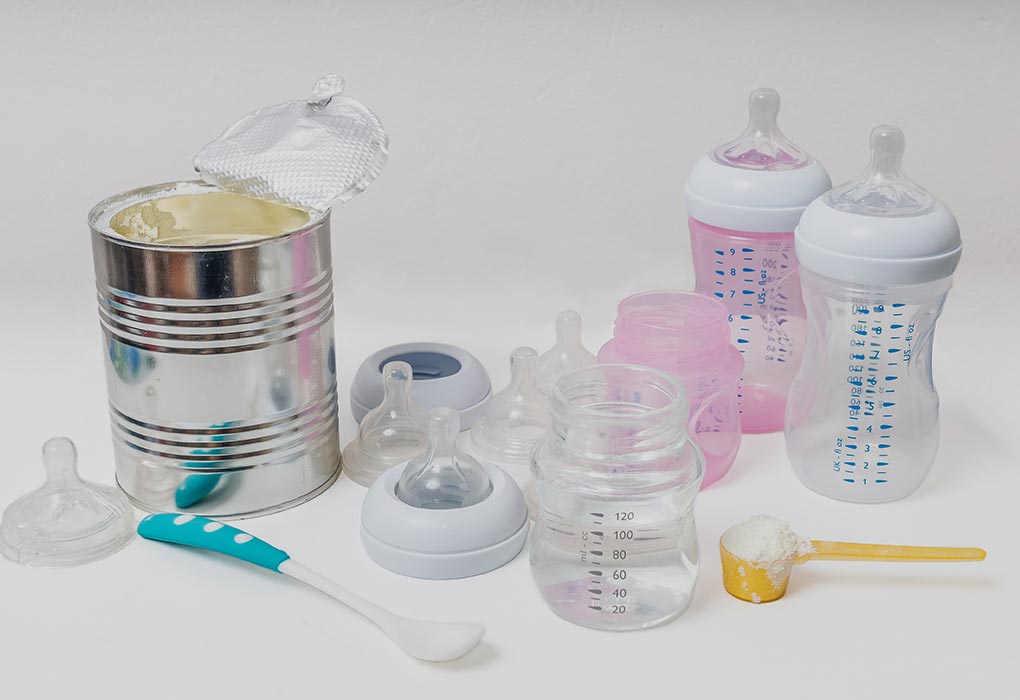In this Article
Parents consider themselves the best judge for the needs of their baby. Which is why many parents don’t even wonder whether it is possible to overfeed a baby. This has resulted in many instances where a child has been overweight or has resulted in reduced growth, with many issues that are temporary or can even morph into something permanent.
Can You Overfeed a Baby?
If a parent understands the proper cues of a child and uses the recommendations of the doctor as general awareness, then the chances of overfeeding are next to none. However, any coercion to reach a certain goal or target of milk consumption can make overfeeding a possibility.
Who Is at Risk of Overfeeding?
While overfeeding may generally be observed in any baby, certain children might be at a higher risk for it. Babies less than 12 weeks old cannot control the flow of milk, causing them to drink a lot more than is needed for them. Similarly, if a baby is used to being bottle-fed, the control over milk flow is quite difficult as compared to that of a mother’s breast.
What Causes Baby to Overfeed?
For parents wondering can you overfeed a baby on formula, it is important to know that the tendency to overfeed is not purely dependent on the source. There are numerous causes that can lead a baby to overfeed.
1. Indirect Linking of Feeding with Sleep
This is quite common amongst infants and also tends to be a habit supported by parents as well. Babies might fall asleep on the mother’s breast in the early months while feeding. But this can continue later in life, and cause a connection to form in the baby’s mind between the two. This can cause a baby to want milk when he actually wants to sleep. Later, if a baby finds himself awake at night, he won’t be able to put himself back to sleep unless he is fed again. Such repetitive scenarios can confuse parents by knowing when the baby is really hungry.

2. Constant Interruptions in Sleep
While the previous scenario might cause a baby to ask for food after his sleep is broken, a little one who usually has short sleep cycles than most would be even more dependent on feeding activities than anybody else. Once a child wakes up, he needs some stimulation to stay awake and might get cranky quite often. All of this results in crying and wailing, which could make a mother offer her breast or formula. The suckling automatically calms the child, leading parents to believe that the baby woke up because he was hungry, and further reinforce the connections of feeding with sleep.
3. A Subjective Image of a Healthy Child
Healthiness is medically defined by a series of parameters and their effective values, but these may not apply to parents. For first-time parents, their opinion of a child that is healthy is governed heavily by advertisements and photos of babies that they come across, making a rotund chubby baby as the ultimate goal. Some babies are naturally born with a smaller and leaner body, and that’s healthy as well. But parents might coerce the baby into drinking more milk than needed, in a well-intentioned attempt to fatten him up, leading to overfeeding.

4. Opting for Fortified Milk Over The Normal One
Fortified milk or high-energy milk is usually recommended by doctors for babies that are lacking in certain nutrients or have been born prematurely and need some important nutrients on priority. Such formulas contain a higher proportion of calories as well as numerous nutritional elements. While this is extremely beneficial for babies that are ill or weak, a normal baby tends to receive an abnormally high amount of nutrition in the same quantity of milk or formula, resulting in an overfeeding that can be quite difficult to recognise.
5. Estimating The Requirement of Milk on a Higher Side
If you were to check the packaging of formula, there are usually estimates and proportions mentioned on it, which determine a healthy quantity of intake for a child. However, these are usually defined on an average, while there can be babies who can receive healthy nutrition in a lesser quantity of milk. Parents usually follow this to the letter and work towards ensuring their baby has the complete amount of formula prepared for him, even though he might not need it. The usual cues of a baby that signify completion of feeding are ignored in the service of taking the amount mentioned on the package as a target to be completed. This is highly observed in the case of premature babies to a high degree.

6. Disregarding The Baby’s Signs and Cues
Quite contrary to what most parents might believe, babies generally have a pretty good sense of their own hunger and know inherently when they are satisfied. Once a child senses his stomach is full, he usually stops feeding automatically. Older toddlers will push away the bottle or move their face away from the breast once they are done the feeding. All these signs are important to note and have a better judgement of your little one’s appetite. If these are ignored, your baby is at higher risk of being overfed.
7. Feeding in a Hurried Manner
This usually is a problem with most babies who are used to feeding when their hunger pangs have lasted for a long time. Such babies grab hold of the breast or the bottle the moment they get it and gulp down enormous quantities of milk quickly. Furthermore, the milk flow rate from the nipple and the ability of the baby to suck can increase the rate extensively. Such instances can lead a baby to feed a lot more than needed because it takes the body some time to sense the feeling of satisfaction from the stomach.

8. An Involuntary Reflex of Sucking Actively
Babies are generally born with the ability to suck, which is integrated within them as a reflex. The moment any object creates a pressure on the mouth, including the tongue and the mouth’s roof, the sucking reflex is activated involuntarily. Since this is uncontrollable, babies who are less than 12 weeks old don’t have the capacity of controlling the flow of milk. In such a case, if the bottle or the nipple has a higher flow rate or a larger hole, a baby will tend to drink in a large quantity of milk than needed, before he can stop the sucking reflex completely.
9. Misinterpretation of Cues Indicating Hunger
The number one fallacy that most parents tend to fall for. Babies only know how to cry, no matter what they feel. But parents are usually geared to interpret that as a sign of being hungry. Further combined by the involuntary sucking activity, their opinion seems to be validated, which isn’t the actual case. A child can usually engage in sucking activity and cry out purely because he is bored or tired. If a parent chooses to feed the child every time he cries, there is a high chance that the little one is going to be overfed.

Signs And Symptoms of Overfed Baby
Any instances of overfeeding are not without the symptoms that display its occurrence. Most of them can be recognised quite easily since they are meant to indicate that corrective action is being undertaken internally.
1. Symptoms Pertaining to Behaviour
Overfeeding causes an additional load on the stomach of the child along with the intestine and the entire digestive system. This leads the body to be irritated from within, which can manifest in an outward crankiness on the part of the child. He would tend to be highly irritated than usual, as well as face broke sleep cycles as a result.
2. Symptoms Pertaining to the Intestines
When a lot of milk is present in the body, the intestine cannot process all of it. This leads to large quantities of undigested food to remain within the intestine. This begins to ferment and cause the baby’s poop to be extremely smelly, slightly liquefied, or even result in explosive pooping. Farts tend to increase in quantity, and some babies might even experience cramps or spasms as a result of it.
3. Symptoms Pertaining to the Gastric Tract
The large quantity of milk also causes the stomach to stretch beyond its usual capacity to house the food within it. As a result, the extra milk can find its way back into the baby’s mouth in the form of repeated regurgitation. If a child has swallowed milk speedily, he also intakes a lot of air along with it. In such a case, a burp can morph into a belch and throw up some milk along with it.
Signs That Mom is Overfeeding The Infant
A mother’s love can overflow in case of her child quite easily, leading her to feed him a lot more than he actually needs. Infants do show some strong signs in such cases, which are necessary for a mom to be aware of.
1. Constant Wakefulness During Sleep
While hunger can be a strong reason to wake up a child from a deep slumber, overfeeding can also be a cause behind it. The internal irritations of the body can cause a child’s sleep to be disturbed and lead him to awaken, and even cry out at times.
2. Visible and Substantial Increase in Weight
Most mothers are ecstatic on seeing their children put on weight and get closer to the chubby child they’ve dreamed about. But this chubbiness can also get out of hand and lead a tiny tot to become a giant toddler at a young age.

3. A High Presence of Stomach Related Issues
The consequences adults face in having a large meal are quite similar to what babies face as well. His stomach can feel bloated, cramps can ensue, and some babies can even have diarrhoea as a result of overfeeding. Mothers can worsen it by feeding the child, even more, when he cries due to stomach pain.
4. Reduced Activity in a Baby
Was your baby quite energetic and loud earlier but now seems to have fallen into a sluggish zone? That’s a strong sign of overfeeding a baby. Drinking more milk in fact results in low energy in babies, leading them to be lethargic all the time. Babies who breastfeed usually suffer from such tendencies.

5. Inability to Sleep Throughout The Night
Not all babies sleep through the night, but if any behaviour seems out of the ordinary, then your baby might be at the risk of being overfed. The night sleep in a baby can be unbroken only if his body has quietened down and there is a low chance of him wetting his diaper.
6. Increased Farting or Expelled Pooping
At times, farts in a baby can increase because you have consumed a food item that has an unintended consequence. But if that seems to be the case no matter what you eat, then the farting or expelled pooping is a sign that your baby’s body is reacting to being overfed.

7. Being Constantly Cranky and Fussy
Crying babies are not a novelty for parents. But if your child has suddenly seemed to be in a bad mood in recent weeks, which also tends to happen mostly an hour or so after feeding, that fussiness is a strong sign of stomach pain resulting from overfeeding your baby.
8. The Need to Frequently Change Diapers
On an average, babies tend to urinate around 8 times in a day. This is a result of the number of feedings a child has had, and their quantity as well. If you notice that the frequency has received a sudden boost in recent times, keep track of your feeding cycles as well.

9. Repeated Burps Even after a Burping Session
Burping a child after feeding is highly recommended since babies do end up swallowing air inadvertently while feeding. If your baby ends up burping later on, even after he has burped after the feeding session, then it could indicate the presence of gas in the stomach, which is a result of overfeeding.
10. An Unexpected Reduction in Growth
This might seem surprising to most parents, but overfeeding does actually impact the growth of a child negatively, too. Since the body is under immense stress from the extra food, a lot of nutrients are either dispelled in the poop or thrown up in spit. This results in low nutrition actually being synthesised by the body, impacting the growth of the baby.

Effects of Overfeeding a Baby
While overfeeding a breastfed baby, vomiting is an extreme result that can end up disturbing a child and a real concern. But certain long-term effects can be present in a child as well.
1. Obesity
The body might adjust itself to take in the additional nutrition and begin storing it. Such an effect will end up with the baby putting on oodles of weight and suffering from obesity early in life.
2. Reduced Growth
Constant throwing up of milk or diarrhoeic pooping can lead a child to experience stunted growth and lack of essential strength necessary to promote development.
3. Catch-Down Growth
A variation in the normal growth cycle, this is not the same as poor growth results. It is simply a reduced pace or a reduction from the benchmarks set for the child.
How to Prevent Overfeeding?
A few simple tips can be quite powerful in reducing the chances of overfeeding your baby.
- Recognise the natural cues of your baby and feed accordingly
- Don’t attempt to feed your child the moment he starts crying
- Keep a check on suckling activities by using a pacifier or a safe toy
When to Consult a Paediatrician?
You should contact your doctor if your child fails to reach the appropriate growth markers or shows an excessive increase in weight. Similarly, any gastric issues or behaviour problems should be brought to your doctor’s notice immediately.
There are higher chances of overfeeding your newborn child than overfeeding a 6-month-old baby. Nevertheless, it is necessary to be aware of any signs that might indicate overfeeding and trust your baby to make certain decisions for himself as well.









